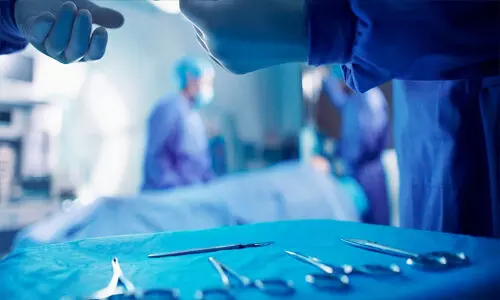- Home
- Medical news & Guidelines
- Anesthesiology
- Cardiology and CTVS
- Critical Care
- Dentistry
- Dermatology
- Diabetes and Endocrinology
- ENT
- Gastroenterology
- Medicine
- Nephrology
- Neurology
- Obstretics-Gynaecology
- Oncology
- Ophthalmology
- Orthopaedics
- Pediatrics-Neonatology
- Psychiatry
- Pulmonology
- Radiology
- Surgery
- Urology
- Laboratory Medicine
- Diet
- Nursing
- Paramedical
- Physiotherapy
- Health news
- Fact Check
- Bone Health Fact Check
- Brain Health Fact Check
- Cancer Related Fact Check
- Child Care Fact Check
- Dental and oral health fact check
- Diabetes and metabolic health fact check
- Diet and Nutrition Fact Check
- Eye and ENT Care Fact Check
- Fitness fact check
- Gut health fact check
- Heart health fact check
- Kidney health fact check
- Medical education fact check
- Men's health fact check
- Respiratory fact check
- Skin and hair care fact check
- Vaccine and Immunization fact check
- Women's health fact check
- AYUSH
- State News
- Andaman and Nicobar Islands
- Andhra Pradesh
- Arunachal Pradesh
- Assam
- Bihar
- Chandigarh
- Chattisgarh
- Dadra and Nagar Haveli
- Daman and Diu
- Delhi
- Goa
- Gujarat
- Haryana
- Himachal Pradesh
- Jammu & Kashmir
- Jharkhand
- Karnataka
- Kerala
- Ladakh
- Lakshadweep
- Madhya Pradesh
- Maharashtra
- Manipur
- Meghalaya
- Mizoram
- Nagaland
- Odisha
- Puducherry
- Punjab
- Rajasthan
- Sikkim
- Tamil Nadu
- Telangana
- Tripura
- Uttar Pradesh
- Uttrakhand
- West Bengal
- Medical Education
- Industry
Increased caffeine consumption doubles renal calcium clearance, study finds

CAPTION
The scientists have demonstrated that consuming caffeine (about 3 mg/kg or the equivalent of a strong coffee) half an hour before aerobic exercise significantly increases fat-burning
CREDIT
University of Granada
Australia: Excessive caffeine consumption could increase renal calcium clearance in healthy patients by 77% which in turn could contribute to osteoporosis, reveals a recent study by researchers from the University of South Australia. The study assessed the impact of high-dose, short-term caffeine consumption.
The study results, published in the British Journal of Clinical Pharmacology, present a warning related to overconsumption of coffee and other caffeinated beverages even among healthy people.
Previous studies have shown caffeine consumption to be associated with osteoporosis due to enhanced bone resorption as a result of increased excretion of calcium in the urine. However, calcium amount in the urine may not necessaritly reflect the true effect of caffeine on calcium clearance. Considering the same, Stephanie E. Reuter, UniSA Clinical & Health Sciences, University of South Australia, Adelaide, SA, Australia, and colleagues aimed to examine the impact of high-dose, short-term caffeine intake on renal clearance of calcium, sodium and creatinine in healthy adults in this double-blind clinical study.
The participants were made to chew caffeine (n=12) or placebo (n=12) gum for 5 minutes at an interval of 2-hours over a 6-hour treatment period (800 mg total caffeine).
They fund that caffeine increased renal calcium clearance by 77%. Furthermore, the effect was positively correlated with sodium clearance and urine volume. This suggests that caffeine may act through inhibition of sodium reabsorption in the proximal convoluted tubule.
"This study confirmed that caffeine does increase renal calcium clearance and fosters further investigation into safe consumption of caffeine," concluded the authors.
Reference:
The study titled, "The effect of high-dose, short-term caffeine intake on the renal clearance of calcium, sodium and creatinine in healthy adults," is published in the British Journal of Clinical Pharmacology.
DOI: https://bpspubs.onlinelibrary.wiley.com/doi/10.1111/bcp.14856
Dr Kamal Kant Kohli-MBBS, DTCD- a chest specialist with more than 30 years of practice and a flair for writing clinical articles, Dr Kamal Kant Kohli joined Medical Dialogues as a Chief Editor of Medical News. Besides writing articles, as an editor, he proofreads and verifies all the medical content published on Medical Dialogues including those coming from journals, studies,medical conferences,guidelines etc. Email: drkohli@medicaldialogues.in. Contact no. 011-43720751




